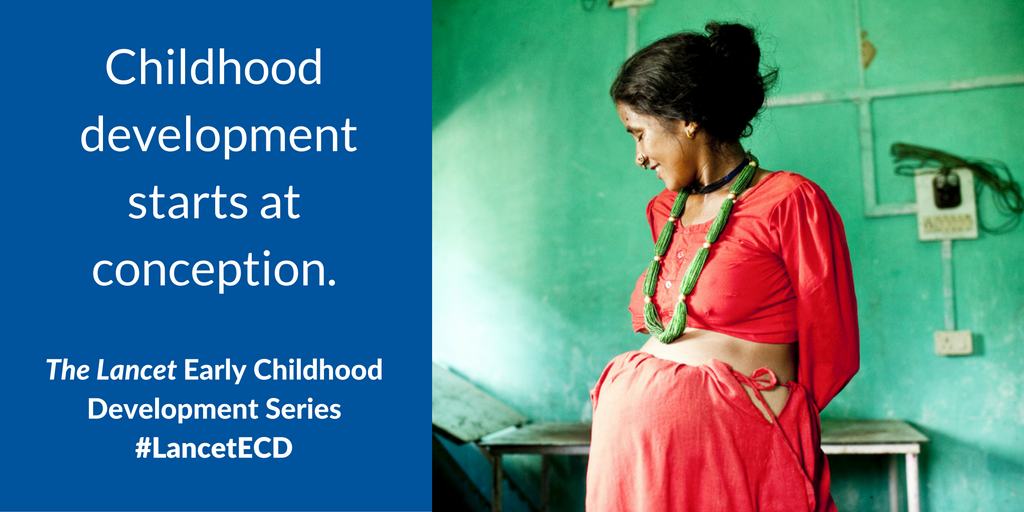Lancet series launches to advance nurturing care for early childhood development
On 5 October 2016, the new Lancet Series, “Advancing Early Childhood Development: from Science to Scale,” was launched ahead of the World Bank Group and International Monetary Fund Annual Meetings. This Series considers new scientific evidence for interventions, building on the findings and recommendations of previous Lancet Series on child development (2007, 2011), and proposes pathways for implementation of early childhood development at scale.
 On 5 October 2016, the new Lancet Series, “Advancing Early Childhood Development: from Science to Scale,” was launched ahead of the World Bank Group and International Monetary Fund Annual Meetings. This Series considers new scientific evidence for interventions, building on the findings and recommendations of previous Lancet Series on child development (2007, 2011), and proposes pathways for implementation of early childhood development at scale. The Series reveals that properly-funded policies and programmes during the first 1000 days of a child’s life could help 250 million at-risk girls and boys. Those crucial 1000 days are when a child most needs development care including early learning, health, nutrition, play and security.
On 5 October 2016, the new Lancet Series, “Advancing Early Childhood Development: from Science to Scale,” was launched ahead of the World Bank Group and International Monetary Fund Annual Meetings. This Series considers new scientific evidence for interventions, building on the findings and recommendations of previous Lancet Series on child development (2007, 2011), and proposes pathways for implementation of early childhood development at scale. The Series reveals that properly-funded policies and programmes during the first 1000 days of a child’s life could help 250 million at-risk girls and boys. Those crucial 1000 days are when a child most needs development care including early learning, health, nutrition, play and security.
- Executive Summary
- Paper 1: Early childhood development coming of age: science through the life course Full-Text HTML | PDF
- Paper 2: Nurturing care: promoting early childhood development Full-Text HTML | PDF
- Paper 3: Investing in the foundation of sustainable development: pathways to scale up for early childhood development Full-Text HTML | PDF
- View the entire Series at The Lancet online
- Press Release English | Français | Español | العَرَبِيَّة | Português | 中文 |
The findings in this Series underscore the importance of increased global commitment to early childhood development. Individuals are estimated to suffer a loss of about a quarter of average adult income per year, while countries may forfeit up to as much as two times their current GDP expenditures on health or education. Consequences of inaction impact not only present but future generations. Early childhood development interventions that promote nurturing care—health, nutrition, responsive caregiving, security and safety, and early learning—may cost as little as 50 cents per child per year, when combined with existing services such as health. These early years are also a critical period of adaptability and responsiveness to interventions.
The science and economics are clearly on the side of investing in the first 1,000 days of a child’s life, starting with a woman’s pregnancy. If we don’t do this, children fall behind long before they set foot in school and suffer a lifetime of disadvantage. But if we do, we can make an irrevocable difference to their ability to fully participate in the economies of tomorrow as active, productive citizens.”
Keith Hansen, Vice President, Human Development at the World Bank Group and member of the SUN Movement Lead Group.
The first table in Paper 3 identifies a number of policies that are known to be effective, yet large gaps remain in delivery, for example:
- Free early education: Attending pre-school benefits children’s primary school performance, especially when programmes include both education and nutrition, yet only 43% of countries provide at least one free year of pre-school education. Even in high income countries, nearly a third do not provide free pre-school education. Only 40 countries provide the recommended 2 years of free pre-school education (paper 3, fig 2B).
- Paid leave: Parental leave can support bonding and care of young children. Today, all but 8 countries guarantee paid maternity leave, and most provide at least 12 weeks, paying at least two thirds of wages. However, this often does not cover the informal sector and only 77 countries provide any paid leave for fathers.
- Breastfeeding: Breastfeeding reduces the risk of several childhood diseases and improves cognitive function. 139 countries guarantee breastfeeding breaks for at least 6 months, and in 43 countries paid breaks are guaranteed. However, this does not cover the informal sector, and many women are unable to breastfeed in jobs where locations for breast milk pumping or refrigeration are not available.
- Minimum wage: Having a basic income can help provide children with basic needs including healthcare and education. Although minimum wage policies are in place in 88% of countries, many do not guarantee an income that is above the poverty level of $2 per day for a parent supporting a child (paper 3, fig 2A).
The World Health Organization, the World Bank, and UNICEF contributed to and offered guidance to the Series and on the following day, the Annual Meetings featured a major public event on this issue chaired by Jim Yong Kim, President of the World Bank Group, entitled “Human Capital Summit: Investing in the Early Years for Growth and Productivity.”